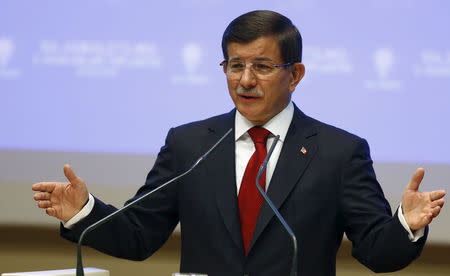Key names out in Turkish interim govt, but AK Party still dominates

By Gulsen Solaker ANKARA (Reuters) - An interim power-sharing government to be announced in Turkey on Friday will see the departure of high-profile figures including Deputy Prime Minister Ali Babacan, senior officials said, but there is little likelihood of any major policy shifts. Prime Minister Ahmet Davutoglu was asked by President Tayyip Erdogan to form the temporary cabinet on Tuesday after the AKP lost its majority in a June election for the first time and then failed to find a junior coalition partner. The election ended more than a decade of single-party rule, unnerving investors in its $870 billion economy as it battles Kurdish militants at home and Islamic State fighters on its borders, helping send the lira to a series of record lows. Along with Babacan - highly regarded internationally for his stewardship of the economy - Energy Minister Taner Yildiz, Foreign Minister Mevlut Cavusoglu and Deputy Prime Minister Bulent Arinc are also likely to leave office because of an AKP rule limiting them to three terms in parliament. Davutoglu said he would present the list of names for the new cabinet - which will be tasked with leading Turkey to a new election on Nov. 1 - to Erdogan for approval later on Friday. "This will be the most concrete step on the path to the snap election," he told a meeting of AKP officials in Ankara, vowing that it would be more than just a caretaker government. "On our way to Nov. 1, we will act like a government elected for four years. Our nation should be at ease about this. We will not be working in the mood of an interim government." But the cabinet is likely to meet only a few times before November and its primary task will be overseeing the election rather than formulating new policy, meaning there is little chance of a shift in direction in key areas such as foreign affairs or the economy, senior officials say. Many existing ministers, including Finance Minister Mehmet Simsek, are expected to retain their positions. Volkan Bozkir, currently EU Affairs minister, is seen as the likely next foreign minister, officials said. Ibrahim Turhan, a former deputy central bank governor and ex-chairman of the Istanbul stock exchange, is meanwhile seen as a potential replacement for Babacan's position overseeing the economy, a role for which he has long been groomed. OPPOSITION ROLE LIMITED Two polls this week have suggested the AKP is unlikely to win back its majority in November, raising the prospect of another round of coalition efforts later in the year, further prolonging the sense of policy stagnation. A third survey, by pollster ORC, which has overestimated ruling party support in the past, suggested the AKP would win 43.7 percent of the vote, up from 40.7 in June. But that would still not necessarily be enough to govern alone. "Although polls vary, no single party currently appears able to win a simple majority in the upcoming elections, suggesting another round of fractious coalition negotiations resulting in a minority government or a multi-party coalition," ratings agency Moody's said in a commentary on Thursday. "Such a government would likely be inherently unstable, and we would expect a high likelihood of additional elections before the nominal end of the parliamentary term in 2019." Davutoglu invited opposition members to take up 11 posts in the 26-member interim cabinet, in line with a constitutional requirement to share power in proportion to the seats political parties hold in parliament. Most declined. Any seats not taken up by opposition parties will be given to independent candidates from outside parliament, although critics say these are likely to be ruling party loyalists. A senior AKP source said that five or six of those seats would most likely go to existing ministry undersecretaries, senior bureaucrats loyal to the ruling party after working under its direction over the past 13 years. The pro-Kurdish Peoples' Democratic Party (HDP) is expected to take up at least two of the three seats it was offered, much to the anger of nationalists, but its leader Selahattin Demirtas has said he doubts the cabinet will take many concrete steps. The main opposition Republican People's Party (CHP) will not take up any of its five seats, including one offered to Deniz Baykal, parliament's oldest deputy, who once led the CHP and was deputy prime minister and foreign minister in the 1990s. The nationalist MHP has also said it does not want to participate in the cabinet, but Tugrul Turkes, son of the party's founder, has said he has accepted one of its three seats, much to the anger of the MHP leadership. (Additional reporting by Orhan Coskun and Ece Toksabay; Writing by Nick Tattersall; Editing by Giles Elgood)

 Yahoo News
Yahoo News 